Unit 3 Travel journal导学案
团陂高中高一unit3导学案
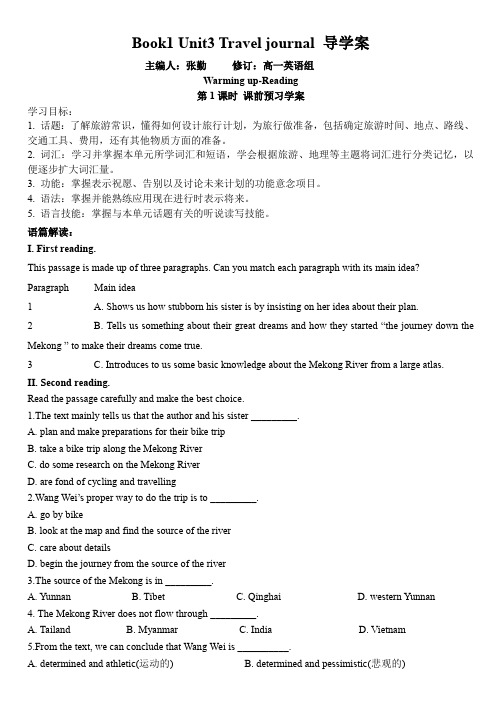
Book1 Unit3 Travel journal 导学案主编人:张勤修订:高一英语组Warming up-Reading第1课时课前预习学案学习目标:1. 话题:了解旅游常识,懂得如何设计旅行计划,为旅行做准备,包括确定旅游时间、地点、路线、交通工具、费用,还有其他物质方面的准备。
2. 词汇:学习并掌握本单元所学词汇和短语,学会根据旅游、地理等主题将词汇进行分类记忆,以便逐步扩大词汇量。
3. 功能:掌握表示祝愿、告别以及讨论未来计划的功能意念项目。
4. 语法:掌握并能熟练应用现在进行时表示将来。
5. 语言技能:掌握与本单元话题有关的听说读写技能。
语篇解读:I. First reading.This passage is made up of three paragraphs. Can you match each paragraph with its main idea? Paragraph Main idea1 A. Shows us how stubborn his sister is by insisting on her idea about their plan.2 B.Tells us something about their great dreams and how they started “the journey down the Mekong ” to make their dreams come true.3 C. Introduces to us some basic knowledge about the MekongRiver from a large atlas.II. Second reading.Read the passage carefully and make the best choice.1.The text mainly tells us that the author and his sister _________.A. plan and make preparations for their bike tripB. take a bike trip along the MekongRiverC. do some research on the MekongRiverD. are fond of cycling and travelling2.Wang Wei’s proper way to do the trip is to _________.A. go by bikeB. look at the map and find the source of the riverC. care about detailsD. begin the journey from the source of the river3.The source of the Mekong is in _________.A. YunnanB. TibetC. QinghaiD. western Yunnan4. The Mekong River does not flow through _________.A. TailandB. MyanmarC. IndiaD. Vietnam5.From the text, we can conclude that Wang Wei is __________.A. determined andathletic(运动的)B. determined and pessimistic(悲观的)C. outgoing and indifferent(不在意,不关心)D. sensible(明智的) and enthusiasticIII. Third reading.Read the passage for the third time and answer these questions.1. What was Wang Kun and Wang Wei’s idea of a good trip?_______________________________________________________________________________2. Who planned the trip to the Mekong?_______________________________________________________________________________3. What can you see when you travel along the Mekong?_______________________________________________________________________________4. What difficulties did Wang Kun and Wang Wei find about their journey?_______________________________________________________________________________IV. Find out the following phrases in the passage.1. 梦想做某事_________________2. 说服某人做某事_________________3. 使某人对做某事感兴趣_________________4. 大学毕业之后_________________5. 从源头到终点_________________6. 为旅行制定计划_________________7. 给某人一个坚定的眼神_________________ 8. 穿过深谷_________________9. 在海拔高度5000多米_________________ 10. 对……的态度_________________V. Analyze the important sentences.1. They are Dai and grew up in western YunnanProvince near the LancangRiver, the Chinese part of the river that is called the MekongRiver in other countries.2. It was my sister who first had the idea to cycle along the entire MekongRiver from where it begins to where it ends.3. Although she didn’t know the best way of getting to places, she insisted that she organize the trip properly.4. She gave me a determined look——the kind that said she would not change her mind.5. When I told her the air would be hard to breathe and it would be very cold, she said it would be an interesting experience.6. Once she has made up her mind, nothing can change it.7. We found a large atlas with good maps that showed details of world geography.8. It makes wide bends or meanders through low valleys to the plains where rice grows.Unit3 Travel journal 导学案主编人:张勤修订:高一英语组Warming up-Reading第2课时课内探究学案学习目标:1. 话题:了解旅游常识,懂得如何设计旅行计划,为旅行做准备,包括确定旅游时间、地点、路线、交通工具、费用,还有其他物质方面的准备。
Book1 Unit3Travel journal Learning about language
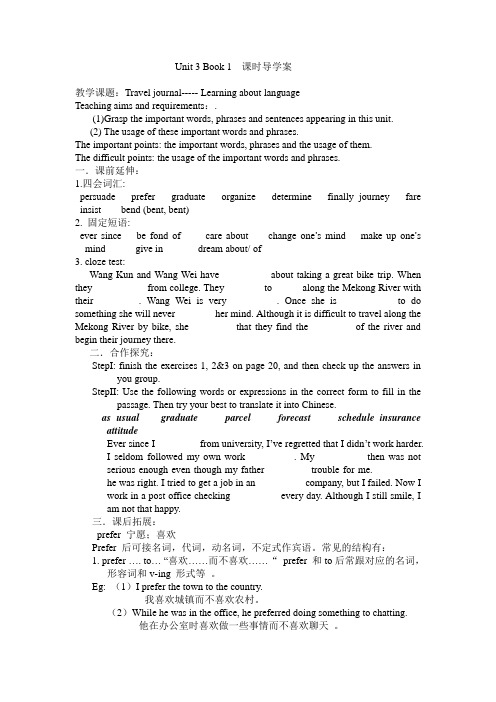
Unit 3 Book 1 课时导学案教学课题:Travel journal----- Learning about languageTeaching aims and requirements:.(1)Grasp the important words, phrases and sentences appearing in this unit.(2) The usage of these important words and phrases.The important points: the important words, phrases and the usage of them.The difficult points: the usage of the important words and phrases.一.课前延伸:1.四会词汇:persuade prefer graduate organize determine finally journey fare insist bend (bent, bent)2. 固定短语:ever since be fond of care about change one’s mind make up one’s mind give in dream about/ of3. cloze test:Wang Kun and Wang Wei have _________ about taking a great bike trip. When they __________ from college. They _______ to _____ along the Mekong River with their ________. Wang Wei is very _________. Once she is __________ to do something she will never _______ her mind. Although it is difficult to travel along the Mekong River by bike, she ________ that they find the ________ of the river and begin their journey there.二.合作探究:StepI: finish the exercises 1, 2&3 on page 20, and then check up the answers in you group.StepII: Use the following words or expressions in the correct form to fill in the passage. Then try your best to translate it into Chinese.as usual graduate parcel forecast schedule insurance attitudeEver since I ________ from university, I’ve regretted that I didn’t work harder.I seldom followed my own work _________. My _________ then was notserious enough even though my father ________ trouble for me. _________ he was right. I tried to get a job in an _________ company, but I failed. Now I work in a post office checking _________ every day. Although I still smile, I am not that happy.三.课后拓展:prefer 宁愿;喜欢Prefer 后可接名词,代词,动名词,不定式作宾语。
马婧教案设计Unit 3 Travel journal (reading)

全国中小学“教学中的互联网搜索”优秀教学案例评选Unit 3 Travel journal (reading)五、教学过程Step 1:Lead inT: Do you like traveling? Present some pictures of beautiful places to arouse their interests of traveling. Meanwhile, the teacher can also ask some more questions to make the students say something about their journey.More questionsQ1: Have you visited any river?Q2: How many great rivers do you know? (Mekong, Seine, Nile, Thames, Congo, Amazon, Mississippi, )Step 2:pre-readingT: Have you visited the Mekong River? If no, let’s learn something about it.①Enjoy a video of the Mekong River from the internet/programs/view/MXw_XNTxQlM/②Show a picture of the Mekong River from the internetQ1: Can you list the countriesthat the Mekong River flowsthrough?China→Myanmar→Laos→Thailand→Cambodia→Vietnam→South China SeaStep 3 ReadingTask1Fast reading (go through the whole passage) True or False?1.Both Dao Wei and Yu Hang are Dai and they grew up in eastern Yunnan province2. The source of Mekong is in Qinghai province.3. They found few atlas and books about Mekong River in library.4 Mekong river begins at glacier on a Tibet mountain. The water there is clear but not cold.5. The Tibetan Mountain where the Mekong River begins is 5,000 meters high.Task2: Match the main idea with each paragraphTask3 Careful Reading1 Could you use some words or phrases to describe the characters of Wang Wei and Wang kun?Wang Wei:Wang kun:2 Know “The Mekong River ”better① The Mekong River begins in glacier on a Tibetan mountain. At first the river is and the water is clear and cold. /fg/jidibinshan/10.jpg② It becomes rapids as it passes through deep valleys , traveling across western Y unnan Province.Para.1 Para.2 Para.31. The preparation before the trip and details about Mekong River2. Different attitudes between them.3. Decide to take a great bike trip along the Mekong RiverSerious = careful;Clever stubborn; determined; wouldn ’t change her mind;adventurous (喜欢冒险的)③Sometimes the river becomes a waterfall and enters wide valleys.④After it leaves China and high altitude, the Mekong becomes wide , brown and warm . As it enters Southeast Asia, its pace slows.⑤It makes wide bends or meanders through low valleys to the plain where rice grows. At last, the river delta enters the South China Sea.step4: Consolidation①a test_Ever since_ middle school, Wang Kun and his sister had _dreamed about_ taking a great bike trip. After _graduating from_ college, with cousins they finally got the _chance__ to take the trip. Once Wang Wei had __made up her mind_, nothing could change her mind. Finally, they agreed to start their journey at _an altitude of_ more than 5,000 meters. From the atlas they learnt that the Mekong begins in a Glacier on a _Tibetan mountain_. At first it is small and the water is _clear__ and _cold___. As it enters Southeast Asia, its _peace_ slow and at last it flows into the _South China Sea_.②Discussin g1. What do you think of Wang Wei?2. What can you learn from her?After discussing, Teacher give some proverbs :Success belongs to the persevering. 胜利属于有毅力者。
Unit3 Travel Journal 课文课堂学案
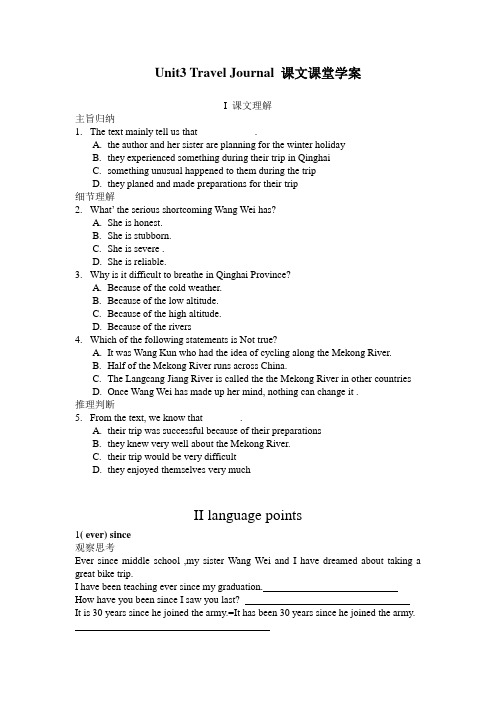
Unit3 Travel Journal 课文课堂学案I 课文理解主旨归纳1.The text mainly tell us that ___________.A.the author and her sister are planning for the winter holidayB.they experienced something during their trip in QinghaiC.something unusual happened to them during the tripD.they planed and made preparations for their trip细节理解2.What’ the serious shortcoming Wang Wei has?A.She is honest.B.She is stubborn.C.She is severe .D.She is reliable.3.Why is it difficult to breathe in Qinghai Province?A.Because of the cold weather.B.Because of the low altitude.C.Because of the high altitude.D.Because of the rivers4.Which of the following statements is Not true?A.It was Wang Kun who had the idea of cycling along the Mekong River.B.Half of the Mekong River runs across China.C.The Langcang Jiang River is called the the Mekong River in other countriesD.Once Wang Wei has made up her mind, nothing can change it .推理判断5.From the text, we know that _______.A.their trip was successful because of their preparationsB.they knew very well about the Mekong River.C.their trip would be very difficultD.they enjoyed themselves very muchII language points1( ever) since观察思考Ever since middle school ,my sister Wang Wei and I have dreamed about taking a great bike trip.I have been teaching ever since my graduation.How have you been since I saw you last?It is 30 years since he joined the army.=It has been 30 years since he joined the army.Since this method doesn’t work, let’s try another.归纳用法巩固运用1)They __________ _______ (see) each other often _______ they_______(meet)last time.2)It _____ _________ _______ _________ (很多年)since I ________ (enjoy)myself so much..3)We ____________________________________ (成为朋友)ever since we______(meet) at school.4)_________ (既然)you are able to answer, we should ask someone else.2 seem to do观察思考1)When I told her that our journey would begin at an altitude of more than 5000 meters,she seemed to be excited about it.________________________2) You don’t seem to be quite yourself today._________________________________________3)He doesn’t seem to appreciate (感激) it.=It seems that he doesn’t appreciate it. ___________________________归纳用法巩固运用1)His father _________ _________ __________ a kind man.(看起来像)= It seems that ___________________________________________.2)They __________ __________ ___________ everything.(好像什么都知道)= It seems that _________________________________________.3)They seem to know what they are doing.= _____ _________ ________ they know what they are doing.4)It seems that I can’t stop coughing.= ____ ______ _______ ________ stop coughing.3 主语+be+adj.+to do it is+adj.+todo观察思考1)When I told her air would be hard to breathe and it would be very cold, she said it would be an interesting experience.___________________________2) The problem is hard to solve.= It is hard to solve the problem.________________________________________3) The house is uncomfortable to live in.=I t is uncomfortable to live in the house._________________________________归纳用法巩固运用1)The air would be hard to breathe.=______ would ______ ______air.2) The car is easy to drive.=____ is easy _______ _______ the car.3) The question is impossible to answer.= _____ ____ ___________ _____ _______ the question.4)It is said that the man is hard to ________.A.be got along withB. getting along withC.get on withD.getting along5) They found the lecture hard __________.A.to be understoodB.to understandC.for understandingD.to have been understood4 once 引导从句观察思考1)Once she has made up her mind, nothing can change it. ______________________2)Once you’ve been to China , you’ll understand why I like it so much.________________________________________________3)Once in bed , the children usually stay there.____________________________________归纳用法巩固运用1)她一旦到了,我们就可以开始讨论。
人教版必修Unit3Travel Journal第二篇课文学案
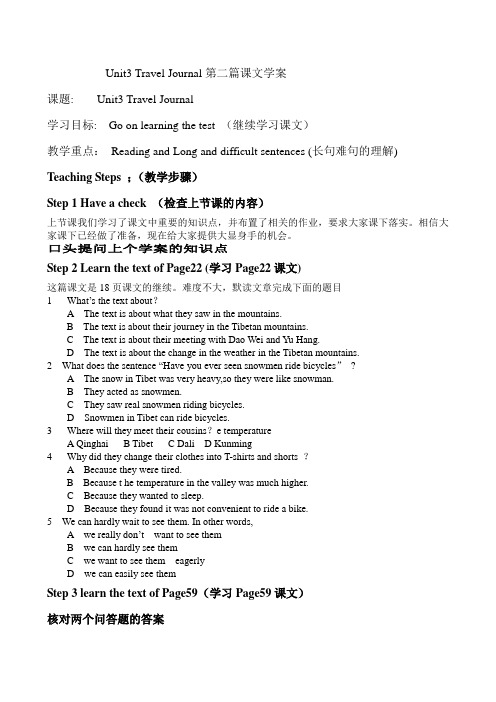
Unit3 Travel Journal第二篇课文学案课题: Unit3 Travel Journal学习目标: Go on learning the test (继续学习课文)教学重点:Reading and Long and difficult sentences (长句难句的理解) Teaching Steps ;(教学步骤)Step 1 Have a check (检查上节课的内容)上节课我们学习了课文中重要的知识点,并布置了相关的作业,要求大家课下落实。
相信大家课下已经做了准备,现在给大家提供大显身手的机会。
口头提问上个学案的知识点Step 2 Learn the text of Page22 (学习Page22课文)这篇课文是18页课文的继续。
难度不大,默读文章完成下面的题目1 What’s the text about?A The text is about what they saw in the mountains.B The text is about their journey in the Tibetan mountains.C The text is about their meeting with Dao Wei and Yu Hang.D The text is about the change in the weather in the Tibetan mountains.2 What does the sentence “Have you ever seen snowmen ride bicycles”?A The snow in Tibet was very heavy,so they were like snowman.B They acted as snowmen.C They saw real snowmen riding bicycles.D Snowmen in Tibet can ride bicycles.3 Where will they meet their cousins?e temperatureA QinghaiB TibetC DaliD Kunming4 Why did they change their clothes into T-shirts and shorts ?A Because they were tired.B Because t he temperature in the valley was much higher.C Because they wanted to sleep.D Because they found it was not convenient to ride a bike.5 We can hardly wait to see them. In other words,____________A we really don’t want to see themB we can hardly see themC we want to see them eagerlyD we can easily see themStep 3 learn the text of Page59(学习Page59课文)核对两个问答题的答案1 six countriesChina Myanmar Laos Thailand Cambodaia Vietnam2 VietnamStep 4 Language points (知识点)我们了解了Page 22和Page59课文的文章大意,下面的时间我们重点学习文章中的知识点,希望大家用心。
Unit 3 Travel journal教案

Unit 3 Travel journalThe first period——ReadingT eaching goals1 T arget languageA.key wordsdream about, finally,persuade, stubborn, insist, properly, determined, attitude, change one's mid, give inB. Sentence structuresIt is /was +that/ who+clause2 Ability goalsGet the students familiar with the geographic terms that go through the unit;By reading the text, the students can conclude Wang Wei's and Wang Kun's attitudes about the trip.3.Learning ability goalsDevelop the students' ability and let them learn to use some reading strategies such as skimming, scanning,and so on.4.Emotional goalsStimulate the students' love for nature by getting them to know the greatness of a river, and to encourage them to fight against difficulties.T eaching important pointsTo comprehend the text is very important;Get the students to express their plans and wishes;Help them learn that travelling is a good way to widen one's view and add to one's knowledge.T eaching difficult pointsHow to grasp the main idea of the text and how to tell the writer's attitude.T eaching methodsTask-based teaching and learningTalking, discussing, and readingT eaching aidsLoud-speaker, MP3 and other normal teaching toolsT eaching procedures and waysStep 1 Greeting and leading in(1) Listen to a song-- Moon River(2) Play a game to guess the names of the rivers1.This river is called our mother river. The water in the river looks yellow._________2.This river is the longest one in China.________3.This river begins at the Jifu mountains in Zaduo County, Y ushu Tibet Autonomous Region of Qinghai province._________Sep 3 pre-reading"where there is a river, there is a city."the relationship between people and river is really close.Q1 How do people make use of the river?______ the fields; go________; make ___________; _________ along the riverA. swimmingB. Irrigate(灌溉)C. travelD. electricityQ2 If you plan to travel along a river,Which river will you choose? How are you traveling?What will you prepare? Who are you going with?Q3 Look at the map on page18, Which countries does the Mekong River flow through?_______________________________________________________________Step 3 While-reading1.SkimmingQ1 What is their dream?Q2 Who are Dao Wei and Y u Hang?Q3 Match each paragraph with their topic sentence.Para.1 We found a large atlas with good maps showed the details of the worldgeography.Para.2 It was my sister who first had the idea to cycle along the Mekong River.Para.3 Although she didn't know the best way of getting to places, she insisted that we find the source of the river and begin our journey there.2.Scanning ----Choose the best answers according to the passage.(1). The source of the Mekong River is in _____ Province.A. QinghaiB. Y unnanC. Sichuan(2). The river’s delta enters _____ .A. the East China SeaB. the Y ellow SeaC. the South China Sea3.Read the text again, and fill in the blankets.Dream Taking a great trip by ____Plan Cycling along the entire _______________ Team Members Wang Kun, ________ and Y u HangPreparations ①Buying expensive mountain bikes②Finding a large ____ with good maps that shows details of world geographyInformation about the River①The Mekong River which is called the Lancang River in China begins in a ______ on a Tibetan mountain and enters the ________________ at last.②At first the river is small and the water is ______ and cold. Then it begins to move ______. After it leaves China and high altitude, it becomes wide, brown and warm. As it enters Southeast Asia, its pace slows.③Sometimes it becomes ______, sometimes it becomes a waterfall.Step 4 After-readingFinish Exercise 1 on page 19Step 5 Compare WangW ei and Wang Kun's different towards the trip.Homework1.Write a travel plan for your winter holiday, containing the following aspect:(1)Destination (place that you are going, background information, purpose......)(2)Time(3)Means of transport(4)Fare(5)Things to take(6)Notice2.Retell the passage in your own words .Blackboard DesignUnit 3 travel journalJourney down the Mekong"Where there is a river, Wang Wei vs. Wang Kun Moral education there is a city. " Stubborn Using an atlasWhich? Don't need is very importantHow? to prepare much it's too cold and highWhat? Must start in Qinghai to start in QinghaiWho? where it begins教学反思:。
Unit 3 Travel journal教案

Unit 3 Travel journalThe First Period ------warming up, pre-readingTeaching aims:1.To talk about the advantages and disadvantages of transports.2.To talk about future plans about holidays.3.To talk about something about rivers.Teaching important and difficult points:To help students talk in English about traveling.Teaching proceduresStep1. Lead-in:Hello everyone. Do you like traveling? Where have you ever been before? How did you get there? If you are given a chance to travel around the world, what kind of transportations will you use?Step2. Warming up:1.Yes. There are so many kinds of transports we can choose to travel, but why do you choose this one not the others. Think about the advantages and disadvantages of each form of transport and fill in the following chart. Suggested answers to Exercise:2. Imagine that you plan to spend a holiday. Choose a place you want to visit. Think about the fare for different kinds of transport and decide how to get there. Then, get into pairs. Use these questions on P17 to make a dialogue about your holidays.Sample dialogue:S1: I’ve planned a trip for my holiday.S2: OK. Where are you going?S1: Lijiang and Dali in Y unnan.S2: Lovely. How are you getting there?S1: As I haven’t much time I think I need to travel by air.S2: That’s going to be very expensive. How much is the fare?S1: About 1,500 yuan.S2:When are you leaving?S1: One week after school finishes for this year.S2: Sounds good to me. Where are you staying?S1: I’d like to stay in local homes.S2: That sounds fun. How long are you staying in Lijiang and how long in Dali?S1: I’m thinking of staying two nights at each place.S2: That’s good. When are you coming back?S1: Five days after I get off.S2: Great. Good luck on your journey!Step3. Pre-reading:1. Imaging and sharingDo you like traveling along a river, ? What role does a river play in2. Talking and sharingAs we all know, there are a lot of rivers in the world and also there are many great rivers. Now look at the chart. In the left column are names of some great rivers. In the right column are locations where the rivers lie. Please match them.Step4. Language points:1.one-way fare / single-way fare (单程票价), round-way fare (往返/双程票价)2. different kinds of transport (Br.E) / transportation(Am.E)3. prefer v.(preferred/preferring)更喜欢,选择某事物(而不选择其他事物)e.g.1). I prefer dogs to cats. 猫狗之中我更喜欢狗。
高一上人教版英语必修1 Book Unit 3 Travel Journal学案语言运用导学案3
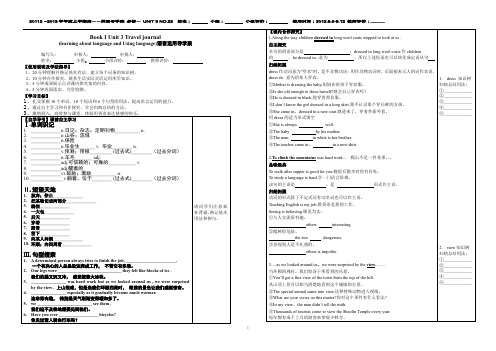
Book I Unit 3 Travel journal(learning about language and Using language)语言运用导学案编写人:审核人:审批人:姓名:小组:小组评价:教师评价:【使用说明及学法指导】1、20分钟理解并熟记基本有法,建立每个词条的知识树。
2、10分钟合作探究,联系生活实际灵活运用所学知识。
3、5分钟成果展示点评课内探究案的内容。
4、5分钟巩固落实、当堂检测。
【学习目标】1、扎实掌握10个单词、10个短语和6个句型的用法,提高语言运用的能力。
2、通过自主学习和合作探究,学会归纳总结的方法。
3、激情投入,高效参与课堂,体验用英语表达情感的快乐。
【自学导引】课前自主学习Ⅰ.单词识记1.____________n.日记;杂志;定期刊物__________ n.2.____________n.山谷;流域3.____________n.保险4.____________n.毕业生______ v. 毕业________ n.5.____________v.预测;预报_________ (过去式)________(过去分词)6.____________n.羊毛_______ adj.7.____________adj.可信赖的;可靠的___________ v.8.____________adj.醒着的_9.____________vt.鼓励;激励__________ n.10._____________v.躺着,位于________ (过去式)________(过去分词)Ⅱ.短语天地1.放弃;停止____________2.把某物切成两部分____________3.确信____________4.一大包____________5.后天____________6.穿着____________7.照常____________8.留下____________9.向某人问候____________10.环顾;向四周看____________Ⅲ.句型搜索1. A determined person always tries to finish the job, _______________________.一个有决心的人总是设法完成工作,不管它有多难。
- 1、下载文档前请自行甄别文档内容的完整性,平台不提供额外的编辑、内容补充、找答案等附加服务。
- 2、"仅部分预览"的文档,不可在线预览部分如存在完整性等问题,可反馈申请退款(可完整预览的文档不适用该条件!)。
- 3、如文档侵犯您的权益,请联系客服反馈,我们会尽快为您处理(人工客服工作时间:9:00-18:30)。
①学法指导:先独立拼读,再向小组内发音较好的同学学习,最难处向老师请教,注意观察并总结发音规律和拼写规律。
②学法指导:先借助字典读懂题目,独立思考后讨论,最难处向老师请教。
③学法指导:抓住主题句,特别是每段的第1句。
④学法指导:未要求做的练习,学生可自行挑战,对照答案后不明白处向老师请教。
______________________________________________
备注:1.本导学案强调的学习方式是自主、合作、探究性学习;
2.在教学过程中主要采用任务型教学模式,其它教学模式作为辅助手段。
自
主
预
习
+
合
作
探
究
自
主
预
习
+
合
作
探
究
一、Warming up(热身部分)
任务:完成课本P17warming up的第2题(Imagine that you plan to spend a holiday. Then, get into groups. Use these questions to make a dialogue about your holidays.)
任务2:本文为3段,仔细阅读课文,概括段落大意,完成下面的连线任务。
Para1Wang Wei is __________.
Para2__________ for their trip.
Para3Wang Kun and Wang Wei’sdream.
任务3:Read the text and try to find out the difficult sentences and then try to analyze or memorize them.
任务4:归纳总结,完成《自summary第33页。
Step 3Post-reading(读后)
任务1:巩固练习,完成课本P20的练习2和3;
任务2:巩固练习,完成《自主学习能力测评》SectionII单词识记和重点短语练习,第33-34页;完成“课堂8分钟”的单词拼写练习,第38页;
2、Look at the map on page18 and list the countries that theMekongRiverflows through.
Step2: reading (读中)
任务1:快速阅读课文,完成《自主学习能力测评》Section1的Step two的练习,第32页。
When are you leaving? Where are you staying?
How are you going to….? How long are you staying in…..?
When are you arriving in/at…? When are you coming back?
自我
评价
学习本课,我可以获得()颗星。(最高为5颗星)
质
疑
与
反
思
1.学生反馈:______________________________________________
______________________________________________。
2.教师反思:_______________________________________________
学校河池三高年级高一学科英语导学案
主备何国玲审核谭绵胜授课人谭绵胜、韦青梅、罗爱月、罗梦甲、黄锦秀、何国玲
授课时间第7周
班级高一班姓名__________学习小组__________
课题
Unit 3 Travel journal
(2004年人教版新课标教材)
课型
听说课(1节)
阅读课(3节)
学习
目标
一、知识目标
重点、难点
了解旅游常识,懂得如何设计旅行计划,为旅行做准备;学习并掌握本单元所学词汇和短语;常见的高考考点。
学法指导
1.自主学习:借助字典等工具,个人先尽力独立完成导学案布置的任务;
2.合作学习:小组长组织讨论学习过程中所遇到的难点并尽力合作解决;
3.探究性学习:个人根据本人情况,在某一方面自主研究,建议借助可以利用的一切途径,如:教师帮助、查阅工具书、通过网络查询等。
S1: As I haven’t much time I think I need to travel by air.
S2: That’s going to be very expensive. How much is the fare?
S1: About 1500 yuan.
S2: When are you leaving?
1、初步理解、掌握课文中关于旅游方面的词语,学习分析课文中的长难句子,初步感知课文中出现的的本单元要学的语法现象。
2、了解一些关于地理风貌的词,列举湄公河流经的国家名称。
3、探讨与旅游相关的各种话题,包括旅游的益处,如何为旅游做准备,在旅游期间应注意的事项等。
二、技能目标
1、通过阅读篇章的主要内容,使学生形成概括归纳能力,猜测能力和细节辨认能力。
S1: One week after school finishes for this year.
S2: Sounds good to me. Where are you staying?
S1: I’d like to stay in local homes.
S2: That sounds fun. How long are you staying in Lijiang and how long
Sample dialogue:(show this dialogue in pairs)
S1: I’ve planned a trip for my holiday.
S2: ok. Where are you going?
S1:Lijiangand Dali inYunnan.
S2:Lovely. How are you getting there?
in Dali?
S1: I’m thinking of staying two nights at each place.
二、Reading (阅读)部分—Journey down the Mekong
Step1: pre-reading (读前)
任务1:回答问题:
1、Many people live beside a river. How do they make use of it in their daily life?
2、形成分析篇章结构的能力,提升逻辑思维能力
3、学会文章主题的方法。
三、策略目标
1、通过图片和标题预测文章内容;运用略读和找读策略迅速获取信息,并能够精读文章获取信息和分析信息。
2、能利用上下文猜测生词词义。
四、情感态度目标
了解湄公河的特点以及湄公河流域的地理风貌,增强对祖国大好河山的热爱和国际意识,加强对世界文化的了解。
